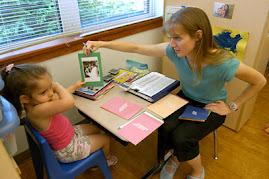And so, a communication system was implemented. Of course there were plenty of times Ben didn't comply, but we worked through them. We had a system going, and that's all that mattered.
When he was ready (attending and compliance somewhat controlled), we began working on colors. I had been eagerly anticipating the day we'd finally start working on his receptive language, and alas, it was here. Now that Ben would point on command, I knew he would be able to let me know when he knew a correct answer.
We started with the color blue. I laid a bright blue flashcard on the table, met his eyes, and said, "Ben, touch blue!" He started to giggle. This was a no brainer for him. He slapped his hand on the flashcard and rolled his eyes as if to say, "c'mon Mindy.. this is peanuts." I gave him some verbal praise, and wondered...... if this was so easy, does it mean he already knows his colors? Thinking quickly, I placed a yellow, red, and blue card on the table. "Ben, where's the blue card?" I asked. He looked at me like I was from Mars, then slapped his hands on all three. "Okay, not ready," I thought. But the only way to know was to try.
While Ben mastered the colors quickly in isolation, he struggled a little when I laid out a distractor. The first distractor I tried was the picture of a dog. I figured if I put down a color together with something that wasn't a color, it would be less confusing. "Ben, point to the blue card," I said. Without hesitation, Ben grabbed the dog, and started imitating a dog's bark. I was baffled. There was so much this child knew. We just had to find a way to get it out.
I'd once observed a child who responded quite similarly in a situation just like this one. When faced with two very different cards, the child grabbed the picture he recognized, and his therapist corrected him. I didn't correct Ben. I didn't think he did anything wrong. Sure, he didn't point to the blue card, but he didn't even hear me. He was too busy being excited that he recognized something he knew, and he was sharing that with me! Why would I reprimand that?
Of course, Jessica the programmer disagreed with me. "....But you reinforced the wrong thing," she said.
"I didn't," I said in my defense. "I told him 'yes Ben, that's the dog! The dog says woof woof!' I reinforced what he knew, and then put the cards back down and stressed the word blue. He got it the second time around."
"These children are very concrete; they aren't going to learn that way," Jessica stressed.
"...But if I saw that he was fixated on the dog," I argued, "I would have errorlessly prompted right away..."
...And then I stopped. Why bother explaining all this to someone who obviously did not share the same viewpoint as me? Apparently I was having a debate with someone who barely even showed for a session.
What was the point? I didn't need her to tell me this child was different. She obviously didn't see the way Ben was eager to learn, eager to smile, and eager to make ME smile. He laughed, he played, and he thrived. While things weren't always perfect, it was fine with me, because nothing in life is ever perfect.
But the truth is, in my eyes, Ben WAS perfect.
Tuesday, June 19, 2007
Wednesday, June 6, 2007
...Problem?
It all depends on the way something is viewed - a lesson for life.
After two weeks of our "pointing problem" I wondered if it was really a problem. You see, Ben was communicating with me. He wasn't avoiding eye contact or interaction; he was playing a game. When he'd run away to the table, he would look for my eyes, and when they'd meet, he'd smirk and bury his face in his hands.
Ben just wasn't reinforced enough at the table - this little game of his was much more fun! Now my job was to make table time even more exciting.
I constantly reinforced his nice sitting and sang songs with motions with him - he loved that! Soon our little pointing mishap was history.
No words can describe just how tickled pink I was the very next day.
I pulled out a magnet book and bubbles, and asked him "Ben, what do you want?" I watched his little index finger form into a point, and he moved it toward the bubbles.
I screamed "hooray!" as I lifted him into the air and blew bubbles around him.
Ben looked me straight in the eye, and smiled.
After two weeks of our "pointing problem" I wondered if it was really a problem. You see, Ben was communicating with me. He wasn't avoiding eye contact or interaction; he was playing a game. When he'd run away to the table, he would look for my eyes, and when they'd meet, he'd smirk and bury his face in his hands.
Ben just wasn't reinforced enough at the table - this little game of his was much more fun! Now my job was to make table time even more exciting.
I constantly reinforced his nice sitting and sang songs with motions with him - he loved that! Soon our little pointing mishap was history.
No words can describe just how tickled pink I was the very next day.
I pulled out a magnet book and bubbles, and asked him "Ben, what do you want?" I watched his little index finger form into a point, and he moved it toward the bubbles.
I screamed "hooray!" as I lifted him into the air and blew bubbles around him.
Ben looked me straight in the eye, and smiled.
Pointing Problem
Ben and I continued to progress, despite the annoying programmer problem. He also remained genuinely reinforced by the toys and games that I brought, as long as I'd rotate them accordingly. We finally established a system where Ben would come to the table when it was time to work - a huge accomplishment.
We did have one little problem, though, in regard to pointing. I always found this program essential and a priority, because if pointing wasn't established, the children would just grab things - not good. And of course the point of the therapy setting is to generalize learned skills outside the therapy room. Pointing was one of those important ones, because many of these children are non-verbal (especially at 1-3 years) and pointing allows them to communicate appropriately.
Ben did have the fine motor skills to point, because I had seen him do it on ocassion. In addition, nothing had given me the idea that Ben couldn't do it, because I watched how he would move his hands and fingers when he'd play with some of my toys. For example, he was able to pick up a puzzle piece just fine, grabbing onto the little peg at the top.
Yet every time he wanted something, he'd moan and try to grab it. Immediately I would physically prompt a point with his cute little finger, and then he'd get really mad at me. Sometimes he would tantrum and throw the item on the floor, or run away from the table. I didn't give in because I knew Ben was aware of what my purpose was, and what was expected of him. He was so smart, he knew exactly what he had to do. He just refused.
In the past I would often make it obvious that I was ignoring the child during behavior like this - but it does depend on the child. If I deemed it necessary, I would insist on prompting through the child's screaming (I'm not heartless - I promise!) and then cheered until my voice was gone, when the task was complete. However, Ben knew he was being silly, and so I didn't bother. I'd just make it very apparent that I was ignoring him, because when he'd run from the table, he'd try and meet my eyes with a nasty grin ;)
This went on for about two weeks. Sally (his foster mom) would always say things like "oh, Ben was bad today" or "wow, I guess he doesn't like you" or even "I guess therapy isn't working, huh" -- all comments that are extremely common for parents/caretakers to mention when things didn't run 100% smoothly.
I explained to her that his screaming or even tantruming doesn't constitute failure. If he wouldn't scream or persist, what was my purpose? I am there to teach him proper communication and necessary skills, and that's a difficult thing to do. Stumbling blocks are expected. You just have to know how to handle them. And I was prepared.
We did have one little problem, though, in regard to pointing. I always found this program essential and a priority, because if pointing wasn't established, the children would just grab things - not good. And of course the point of the therapy setting is to generalize learned skills outside the therapy room. Pointing was one of those important ones, because many of these children are non-verbal (especially at 1-3 years) and pointing allows them to communicate appropriately.
Ben did have the fine motor skills to point, because I had seen him do it on ocassion. In addition, nothing had given me the idea that Ben couldn't do it, because I watched how he would move his hands and fingers when he'd play with some of my toys. For example, he was able to pick up a puzzle piece just fine, grabbing onto the little peg at the top.
Yet every time he wanted something, he'd moan and try to grab it. Immediately I would physically prompt a point with his cute little finger, and then he'd get really mad at me. Sometimes he would tantrum and throw the item on the floor, or run away from the table. I didn't give in because I knew Ben was aware of what my purpose was, and what was expected of him. He was so smart, he knew exactly what he had to do. He just refused.
In the past I would often make it obvious that I was ignoring the child during behavior like this - but it does depend on the child. If I deemed it necessary, I would insist on prompting through the child's screaming (I'm not heartless - I promise!) and then cheered until my voice was gone, when the task was complete. However, Ben knew he was being silly, and so I didn't bother. I'd just make it very apparent that I was ignoring him, because when he'd run from the table, he'd try and meet my eyes with a nasty grin ;)
This went on for about two weeks. Sally (his foster mom) would always say things like "oh, Ben was bad today" or "wow, I guess he doesn't like you" or even "I guess therapy isn't working, huh" -- all comments that are extremely common for parents/caretakers to mention when things didn't run 100% smoothly.
I explained to her that his screaming or even tantruming doesn't constitute failure. If he wouldn't scream or persist, what was my purpose? I am there to teach him proper communication and necessary skills, and that's a difficult thing to do. Stumbling blocks are expected. You just have to know how to handle them. And I was prepared.
Subscribe to:
Posts (Atom)


